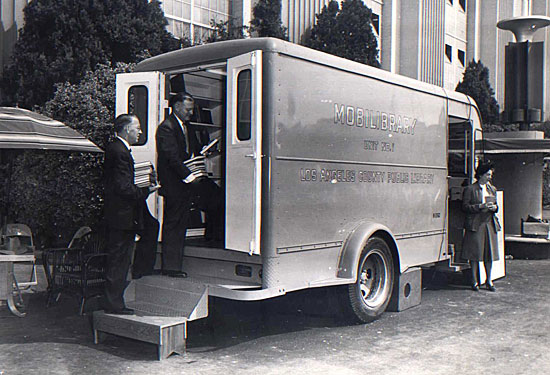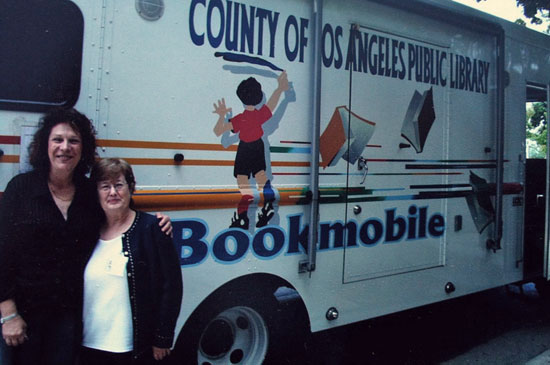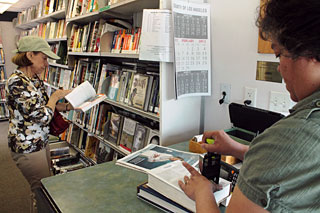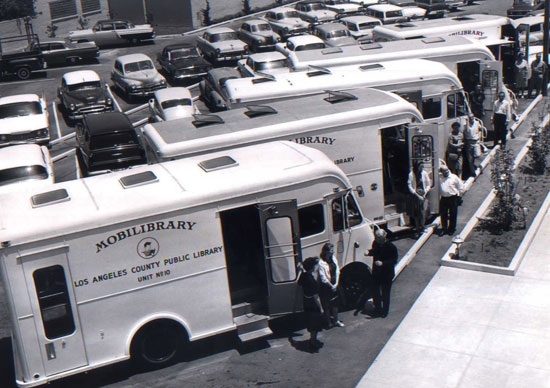End of the road for beloved bookmobile
March 7, 2012

L.A. County's first bookmobile at the 1948 County Fair, with 3rd District Supervisor John Anson Ford (left) and County Librarian John Henderson.
When one chapter opens, another closes. This week, as Topanga breaks in a new, state-of-the-art library, the county will bid farewell to another cherished institution—the Las Virgenes bookmobile.
Twenty-eight feet long and stacked to the rafters, the traveling library has rumbled through the Santa Monica Mountains for generations, serving canyon- and hill-dwellers from Malibu to the Mulholland Highway.
“A lot of people will mourn the loss,” predicts former community library manager Donna Serra, who retired in 2010 after more than a decade as the Las Virgenes “bookmobile lady.”
“People from all walks of life have used that bookmobile. Families, academics, homeless people. People would come and bring their dogs inside with them. When we’d go to Topanga, so many people would come that we’d have to put up a sign saying only so many people could be inside the bookmobile at one time. They even used to put us in their parades.”
On Friday, when the bookmobile finishes its last stop—from 1:30 p.m. to 3: 30 p.m. at Hidden Hills City Hall—its route will be eliminated, leaving only four bookmobiles in the Los Angeles County system. County Librarian Margaret Donnellan Todd says it’s a casualty of time and success.
The vehicle itself is nearing the end of its life span, she says, and the library system has managed in recent years to shore up many of the brick-and-mortar facilities near the mountains.
“We now have the Malibu library, which will reopen in April after a full renovation,” Todd says. “Then there are the libraries in Westlake Village and Agoura Hills, which are both fairly new. The City of Calabasashas a new library, and now there’s the new Topanga library, of course.”
Bookmobiles first caught on in the United States around 1900, when a librarian in rural Maryland used horse-drawn wagons to expand local library service. After World War II, Congress began subsidizing them as a way to bring literacy to rural America. At their peak, some 2,000 were in use nationally. A bookmobile nicknamed “Little Toot” served children in the City of Los Angeles through the 1950s; by the 1960s, there were eight bookmobiles in the Los Angeles County fleet alone.
Since then, though, bookmobile use had gradually dwindled, largely due to rising gas prices, suburban development and the Internet. In 2008, according to the National Library Assn., only about 930 remained on the road nationally, including 69 in California.

The Las Virgenes "bookmobile lady," Donna Sera, left, seen here several years ago with Raya Sagi, formerly of the Agoura Hills Library.
Libraries have been reluctant to get rid of them entirely, and the National Library Assn. still celebrates National Bookmobile Day. In 2009, Los Angeles County added a bookmobile route in the rural Antelope Valley, where three of its vehicles are now assigned, and its fourth—an urban outreach bookmobilethat mostly serves senior communities and housing projects—is among the most popular in the county.
But most parts of Los Angeles now have branch libraries within easy driving distance, Todd says, and most bookmobiles lack the breadth and digital access that brick-and-mortar libraries now offer. The Las Virgenes bookmobile only carried about 2,500 books, CDs, DVDs and other lendable items, while the new library in Topanga alone stocks tens of thousands.
Serra, the retired librarian, says the bookmobile’s limitations were part of what patrons loved about it. In fact, she says, when the traveling library began electronically tracking overdue books, many patrons pined aloud for the days “when you could just sign your name on a card and that was enough.”
Readers may not have had as much to choose from, says Serra, but she made up for that in personal service. Sometimes, she says, she and bookmobile aide William Moore would drop a bag of books at the home of a sick patron, or use their own cars when the bookmobile was broken down or stopped by inclement weather.
Each week, she says, she and her fellow staffers would load up the lumbering vehicle with items they had personally chosen for patrons.
“There was Uncle Dale, a photographer in the movie business who had a lovely little daughter, Fiona,” recalls Serra. “We’d find special things for her, things with princesses and fairies, but also classics like “The Three Musketeers.” And there were the Portmans, another great family—voracious readers. Mrs. Portman would come in and we’d have 50 books set aside, waiting for her.”
Over the years, Serra says, she came to know the minds of thousands of patrons, from celebrities who would wander up the bookmobile stairs incognito to homeless bookworms from Malibu Creek.
One soul, a courteous transient named Daniel, came in regularly for two years to renew “The Complete Writings of Thomas Paine,” she remembers. Another patron made such delicious homemade tomato relish that the staff stocked her favorite authors—J.D. Robb, Iris Johansen—just to ply her for the recipe.
Pets were welcomed, she says, and one of her favorite Topangans perused the stacks for years with a Tennessee squirrel hound named Lily, looking for volumes on spirituality. When the woman died in 2008, Serra went to the memorial service.
“For my birthday one year, she gave me an ancient Sanskrit poem written in calligraphy, about looking forward to each day and living to the fullest,” says Serra. “I still have it here in my house with me.”
Serra predicts it will take time for her former patrons to get used to a library that isn’t on wheels: “They’re a unique group, people who use bookmobiles.”
But Todd, the county librarian, says that the Las Virgenes bookmobile will have its own next chapter: After Friday, it will become either a backup bookmobile or be dispatched as an “express library” to sites undergoing renovation.
“It’ll have a nice part-time job—not a lot of stress, not a lot of mountain roads,” she says, laughing. “I suppose you could say that it will be enjoying its retirement years.”
Posted 2/22/12














 405 bridge work causes a stink
405 bridge work causes a stink
